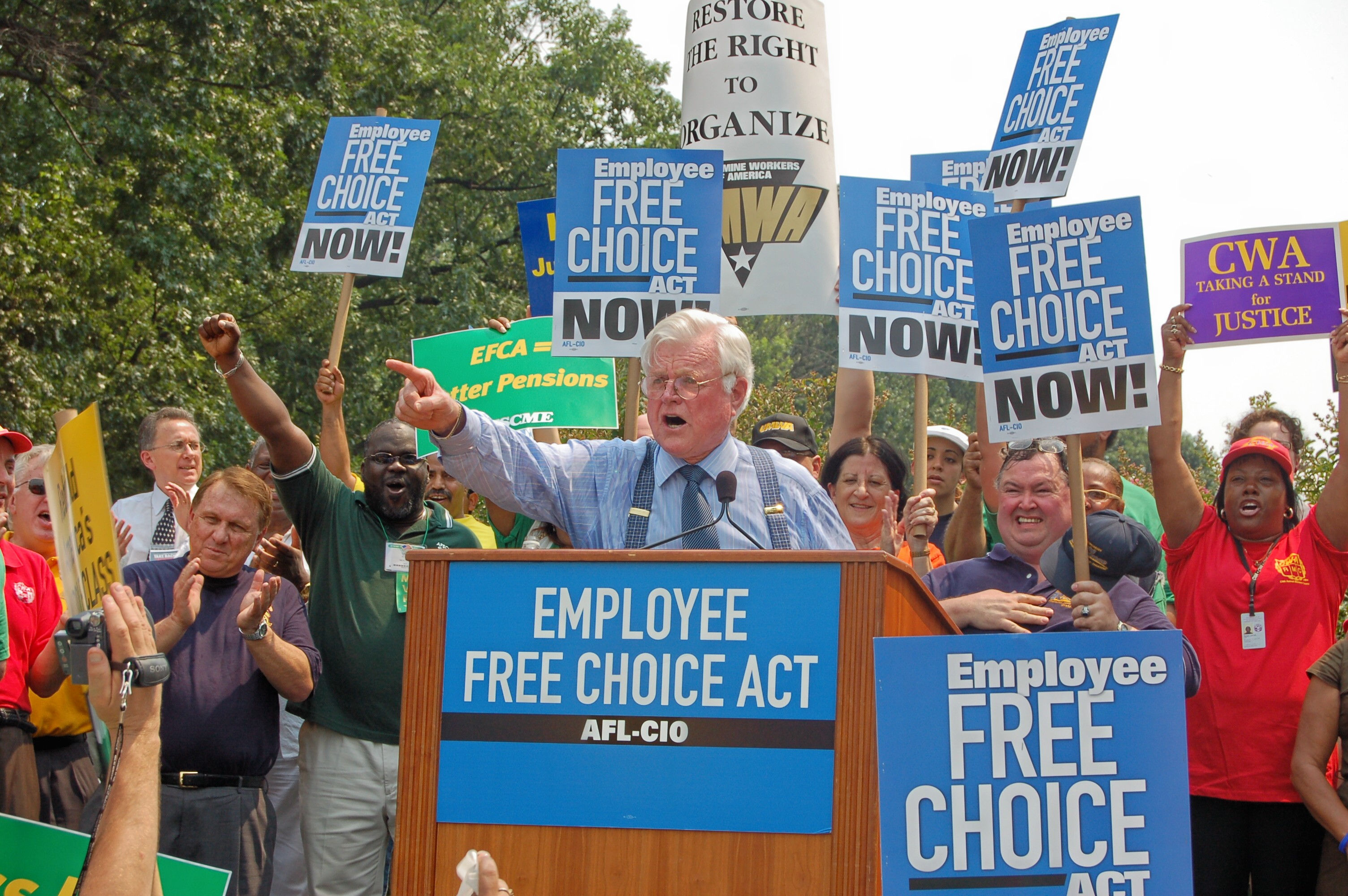
Millions of working-class families are feeling an emptiness today that they know they will have to struggle hard to fill.
Sen. Edward Kennedy’s death creates that emptiness because throughout his political life he had a single-minded focus: the betterment of the lives of the working people. He was the champion of civil rights and equality for African American, Latino, Asian, Native American, and all people of color. Everyone, he said, should be able to take a seat at a lunch counter anywhere in America.
He fought for the rights of lesbian, gay, bisexual and transgender people. Millions of American children have gotten decent educations because of battles waged by the senator. He was in the forefront of the struggle for immigration reform.
He helped put an end to an America that thought it was OK to relegate women to back alleys for abortions.
No one in the Senate spoke out more forcefully for an entire array of workers’ rights, especially the right of workers to choose a union. Then there is health care reform, the signature cause of his life. In its official statement on his passing, the AFL-CIO labor federation said, “Kennedy wasn’t just a co-sponsor of the Employee Free Choice Act. He helped create it, and he was the first to introduce it in the Senate.”
While for some other senators all of these struggles were issues to which they could relate and to which they gave their support, for Kennedy they were a burning passion. Kennedy called health care reform “the cause of my life,” and in 1966 introduced his first health care bill. He had taken a tour of a community clinic at a housing project in Boston and was impressed to see the people there receiving necessary medical care. Some union folks on the tour with him said, as was typical for him, that he noticed everything, including rocking chairs that had been set aside in special waiting rooms for nursing mothers.
In less than 90 days, Kennedy managed to get funding for 30 such clinics in low -ncome areas around the country. Every one of the clinics had the special areas set aside for nursing mothers. A few months later several hundred such clinics were established. The burning passion for justice fueled his entire career in the Senate.
Soon after he was first elected he declared war against the poll tax, which he despised with all his heart. With little power and almost no seniority he tried to kill the poll tax by attaching an amendment to the 1965 Civil Rights Act. Other liberal senators with more power and seniority were afraid to join him in that struggle which, of course, ultimately succeeded.
Senator Kennedy was the greatest senator to serve during the 20th and 21st centuries, if not during the entire history of the United States.
“In a magnificent career,” read the AFL-CIO statement, “Kennedy achieved considerably more than did most presidents, and he proved to be one of the finest friends in public life American working men and women have ever had. “It may seem odd for someone who came from vast wealth and privilege, but his relationship with workers and their unions was one of deep affection and – one hesitates to say it – love. Anyone who ever spotted Kennedy at a Labor Day event or local union meeting could see it. He always listened closely to us. He understood and enjoyed us.”
Kennedy joined his brothers, John and Robert, in their belief that unions were critical to improving the lives of workers.
In his speech at the AFL-CIO Convention in 2005, Kennedy said, “Kennedys are with you because we know the difference you make in the lives of average families. Union workers earn 35 percent more than non-union workers, 40 percent more likely to have health insurance, four times more likely to have a solid pension plan.
“But each year – each year over 20,000 workers are illegally discriminated against for exercising their rights in the workplace. In a quarter of all organizing campaigns, a worker is fired for supporting the union. Every employee who manages to form a union often can’t get a contract because employers refuse to bargain. That’s wrong, and it’s doubly wrong that this GOP Congress won’t fix it.”
While he is greatly missed because he never let up in his fight for working people most in the labor and progressive movements feel that even in his death, the fight goes on.
Millions will see Kennedy’s smile again, they say, on the day President Obama signs into law a bill that provides Americans with affordable universal health care.

MOST POPULAR TODAY

‘Warning! This product supports genocide’: Michigan group aims to educate consumers

After months of denial, U.S. admits to running Ukraine biolabs

“Trail of Tears Walk” commemorates Native Americans’ forced removal

Ohio: Franklin County treasurer attends Netanyahu meeting, steps up Israel Bond purchases

Hold the communism, please: SFMOMA’s Diego Rivera exhibit downplays artist’s radical politics






Comments